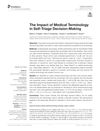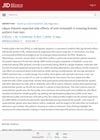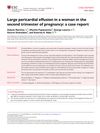 July 2023 in “Journal of Cosmetic Dermatology”
July 2023 in “Journal of Cosmetic Dermatology” Practitioners treating hair loss need better education and resources to overcome challenges like commercial bias and ethical dilemmas.
19 citations,
December 2008 in “Arthritis Care & Research” The decision board effectively helps lupus nephritis patients in Brazil choose treatments by clearly presenting options and side effects.
 1 citations,
July 2017 in “Frontiers in Communication”
1 citations,
July 2017 in “Frontiers in Communication” Using complex medical terms can make people want to seek medical help faster.
January 2023 in “Journal of Cosmetic Dermatology” Alopecia areata gained more interest on social media than pattern hair loss, with TikTok showing more personal stories and YouTube offering higher quality educational content.
 January 2025 in “Dermatology and Therapy”
January 2025 in “Dermatology and Therapy” Hormonal therapies effectively treat acne and improve quality of life.
 July 2024 in “Journal of Investigative Dermatology”
July 2024 in “Journal of Investigative Dermatology” Most women continued using oral minoxidil for hair loss despite mild to moderate side effects.
 11 citations,
November 2022 in “JAMA dermatology”
11 citations,
November 2022 in “JAMA dermatology” Some nutritional supplements may help treat hair loss with generally mild side effects.
 108 citations,
November 2006 in “The Milbank Quarterly”
108 citations,
November 2006 in “The Milbank Quarterly” Drug advertising has greatly increased, changing consumer behavior and raising concerns about its influence on healthcare and patient protection.
 4 citations,
February 2024 in “The Journal of Urology”
4 citations,
February 2024 in “The Journal of Urology” Adding hormone therapy to radiation improves survival for high-risk prostate cancer recurrence but has side effects.
 254 citations,
September 2014 in “Menopause”
254 citations,
September 2014 in “Menopause” The NAMS 2014 recommendations guide healthcare providers on treating health issues in midlife women, emphasizing individualized care and informed decision-making.
 August 2024 in “Nutrition Bulletin”
August 2024 in “Nutrition Bulletin” GLP-1 receptor agonists help with weight loss but need to be combined with other treatments for best results.
 5 citations,
August 2020 in “Dermatologic Therapy”
5 citations,
August 2020 in “Dermatologic Therapy” Most YouTube hair loss treatment videos are popular but often biased and lack reliable sources.
 July 2023 in “IntechOpen eBooks”
July 2023 in “IntechOpen eBooks” New treatments for alopecia areata show promise, but more research is needed to confirm their effectiveness.
 April 2024 in “Journal of burn care & research”
April 2024 in “Journal of burn care & research” Surgery for burn scar alopecia often involves multiple procedures, and treatment options should be more accessible to improve self-image.

Doctors using Google during patient visits can enhance accuracy and outcomes if done transparently and inclusively.
 6 citations,
August 2023 in “Fertility and Sterility”
6 citations,
August 2023 in “Fertility and Sterility” The 2023 guideline for PCOS suggests using updated diagnostic criteria, assessing related health risks, and recommends lifestyle changes and specific treatments for symptoms and fertility issues.
 20 citations,
April 2021 in “Journal of Womens Health”
20 citations,
April 2021 in “Journal of Womens Health” Testosterone can help premenopausal and postmenopausal women with low sexual desire, but its long-term safety is unclear and it's not widely approved for this use.
 January 2020 in “Current trends in diagnosis & treatment”
January 2020 in “Current trends in diagnosis & treatment” The review suggests doctors should carefully weigh risks and benefits of off-label drug use, involve patients in decisions, and calls for better regulations and monitoring.
April 2024 in “Cosmetics” Wigs help improve self-esteem and quality of life for people with hair loss from alopecia areata.

Topical minoxidil and oral finasteride and dutasteride are the most effective treatments for male and female pattern hair loss, but study quality varies.
 February 2024 in “European heart journal. Case reports”
February 2024 in “European heart journal. Case reports” Early surgical intervention and a multidisciplinary approach are crucial for managing complex cardio-obstetric patients.
 December 2023 in “Journal of dermatology”
December 2023 in “Journal of dermatology” Adults and adolescents with severe alopecia areata are willing to take significant health risks for a better chance of hair regrowth.
 10 citations,
March 2021 in “Pediatric dermatology”
10 citations,
March 2021 in “Pediatric dermatology” Dermatologists should understand cultural practices and communicate empathetically to effectively treat skin conditions in children and teens of color.
 October 2023 in “Paediatrics & child health”
October 2023 in “Paediatrics & child health” The document advises health care providers on how to support transgender and gender-diverse youth with appropriate care and referrals.
7 citations,
November 2021 in “JAAD Case Reports” Mogamulizumab can cause hair loss and skin rashes.
 1 citations,
June 2022 in “Journal of Plastic Reconstructive and Aesthetic Surgery”
1 citations,
June 2022 in “Journal of Plastic Reconstructive and Aesthetic Surgery” Hair restoration surgeons have a 15% yearly risk of being sued, and while they often win, the process is stressful and costly.
 July 2019 in “Mayo Clinic proceedings”
July 2019 in “Mayo Clinic proceedings” The man's fatigue and erectile dysfunction were improved by treating his obesity-related low testosterone without needing testosterone replacement.
 6 citations,
February 2023 in “Advances in Therapy”
6 citations,
February 2023 in “Advances in Therapy” Baricitinib, a drug for rheumatoid arthritis, atopic dermatitis, and alopecia areata, is generally safe with low risk of major side effects, even in patients with risk factors. It's also effective in promoting hair regrowth in alopecia areata patients.
 March 2022 in “Women's health issues”
March 2022 in “Women's health issues” The conclusion is that women are heavily affected by autoimmune skin diseases, face significant challenges, and need better research, treatments, and healthcare policies.
 4 citations,
June 2013 in “The Journal of Rheumatology”
4 citations,
June 2013 in “The Journal of Rheumatology” The document concludes that various findings in rheumatology offer insights into disease severity, treatment responses, and potential risks in medication, with some limitations due to unspecified participant numbers.


























